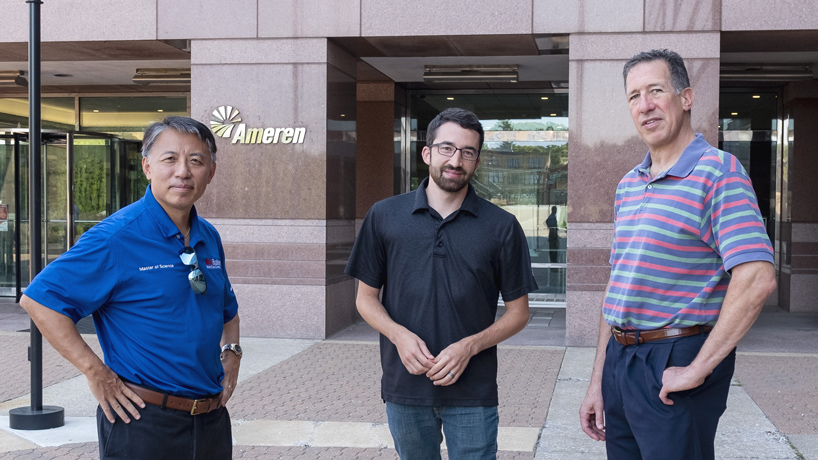
From left: UMSL Supply Chain and Analytics Professor and Department Chair Haitao Li, Ameren Senior Sourcing Specialist Logan Ward and Assistant Teaching Professor Mitch Millstein have worked together develop optimization models and propose ways in which Ameren can streamline its massive equipment warehousing and shipping network. (Photo by August Jennewein)
By David Morrison
When a transformer goes down, electric company customers affected by the outage don’t care how the replacement transformer gets where it needs to go in order to restore their power.
They just care that it gets there. Quickly.
St. Louis-based power company Ameren has a Supply Chain Transformation Initiative in place that’s aimed at determining the best, most efficient and cost-effective ways to distribute materials through its network when a need arises. In this effort, Ameren has enlisted the assistance of University of Missouri–St. Louis researchers to find possible solutions.
UMSL Supply Chain and Analytics Professor and Department Chair Haitao Li and Assistant Teaching Professor Mitch Millstein have worked with Ameren to develop optimization models and propose ways in which the company can streamline its massive equipment warehousing and shipping network.
“Supply chain and analytics is a field driven by real-world practice,” Li said. “The past couple of years during the midst of the pandemic have shown how important logistics and supply chain is to people’s everyday lives. This is a perfect project. It provides an avenue for our department, faculty and students to contribute to a local business in St. Louis, helps Ameren to address their business needs and supports our faculty research as well as our PhD program.”
Ameren has nearly 100 locations throughout its network that contain thousands of items classified into nearly 40 product categories, all of them crucial to the continued operation of Ameren’s power supply for millions of customers.
The company employs a “hub-and-spoke” network, with two central distribution centers and numerous operating centers from which it disseminates needed materials across its 64,000-square mile service territory in Missouri and Illinois.
Logan Ward, a supply chain specialist in Ameren’s Transformation team, has brought his valuable expertise to the UMSL team on this project for the past year and a half. The UMSL team also included PhD student Juan Zhang, who graduated in May and is now an assistant professor of management and marketing at the University of Wisconsin-Eau Claire.
“Our unique strength is our two-pillar focus: the analytic side – the data-driven analytics and methodology – as well as the domain of supply chain and logistics,” Li said. “There is no doubt that our academic field always welcomes real-world, relevant research using real data and working with real companies. In a collaborative project like this, it is important for us to deliver impactful research that goes beyond the goal of publishing in scholarly journals.”
The first phase of the project, with Millstein and Li as the lead researchers, was to identify six figures’ worth of potential cost savings for Ameren in network improvements: where materials such as poles, transformers and other hardware are stored and how they are delivered.
Phase 2, headed by Li and Zhang, involves coping with the supply-side risks and uncertainty to Ameren’s supply network. That includes modeling the uncertain lead times and the possible aftereffects of natural disasters, such as tornadoes or an earthquake, on the supply network.
“We wanted to partner with UMSL to build a model of our current environment and then optimize that,” Ward said. “They’ve shown us the most efficient way to deliver materials throughout our network to our operating centers, as well as some other benefits like business continuity planning and giving us a playbook if certain situations were to arise. We’ve had a lot of very smart people with business know-how at Ameren, but we’ve rarely been able to have this level of data-driven discussions. It has allowed us to have better data-driven decision support around our choices for potential improvements, which has been incredibly helpful.”
The collaborative research project is just another example of the mutually beneficial relationship that UMSL and Ameren share.
Ameren holds a seat on the UMSL Department of Supply Chain and Analytics advisory board, participates in mentorship opportunities for department students and provides real-world projects for students to take on in coursework. Ameren employees are also frequent guest speakers in class sessions and participants in student supply chain club events.
UMSL, in turn, provides the academic backing and research for projects such as the Supply Chain Transformation Initiative and produces work-ready graduates that have entered Ameren’s supply chain operations. Millstein said UMSL has appreciated the support of Ameren Chief Procurement Officer Pardeep Gill, former Director of Supply Chain Operations Ty Lindhorst – who has since moved to a new position – and current department advisory board member and Ameren Director of Supplier Diversity Byron Witherspoon throughout this project.
“You can go right down the line of what we look for in an engaged industry partner to make sure our students are learning what they should be learning, interacting with industry, knowing what the work environment looks like and doing research we can publish, and that’s Ameren,” Millstein said. “They are very invested in our department, and they’re getting the payoff in terms of research output and students they’re hiring.”
This story was originally published in the fall 2021 issue of UMSL Magazine. If you have a story idea for UMSL Magazine, email magazine@umsl.edu.














